Says Amb. Islam of Bangladesh in Seoul an interview with The Korea Post
Ambassador Abida Islam of the People's Republic of Bangladesh in Seoul said, "Bangladesh is one of the fastest-growing economies in the world. Though ready-made garments have been the economy's driving force, Bangladesh is diversifying its economy to pharmaceuticals, I.T., shipbuilding, and others. We applaud South Korea's world-renowned efficiency in pharmaceuticals, ICT and innovation, and I am looking forward to forging a closer partnership with Korea in these sectors in the coming years."
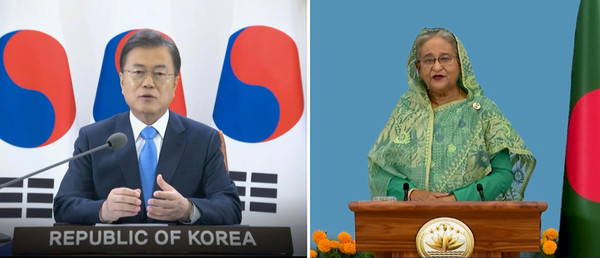
Speaking at an exclusive interview with The Korea Post media, publisher of 3 English and 2 Korean-language news publications since 1985, Ambassador Islam said, " there are several potential areas where both Korea and Bangladesh could partner together for mutual advantage."
Ambassador Islam then stated: "Bangladesh has a stable and growing market of over 160 million people with a strong pharmaceutical base. It produced the generic version of 'Remdesivir' during the pandemic, a drug used for the treatment of COVID-19, and exported quarantine products like masks and PPEs to the United States. With its rapidly growing software and ITES industries, Bangladesh became the 2nd largest supplier of online service-provider. The country is Asia's emerging market for steel and exports small & medium-sized ocean-going vessels to different countries in the world. I hope that Korean companies will be more actively engaged with this rising economy."
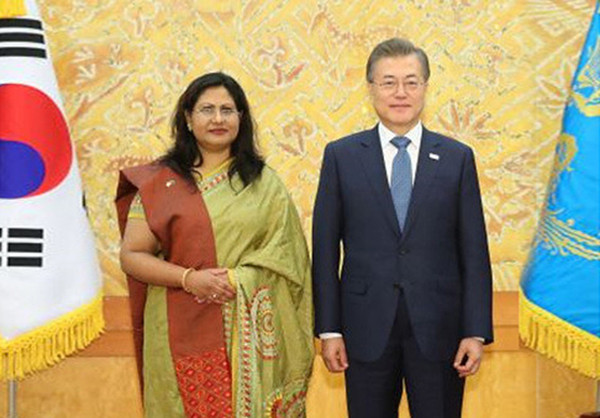
In connection with this, said Ambassador Islam, there should be more frequent engagements between business enterprises of Korea and Bangladesh through dialogues, bilateral meetings and webinars. She also suggested frequent bilateral visits between the two sides once the pandemic situation improves. Details of the interview is as follows:
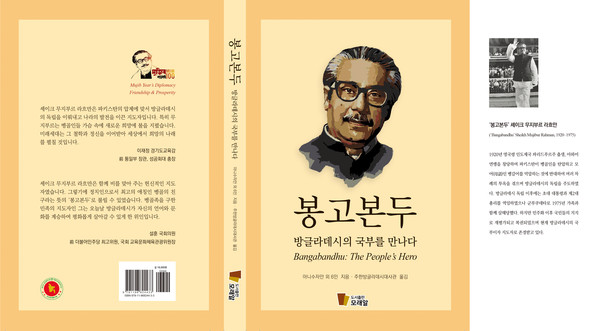
Question: Congratulations on the 50th anniversary of the independence of Bangladesh this year! What is the significance of the occasion?
Answer: The year 2021 is a momentous year for Bangladesh as the country celebrates the Golden Jubilee of its independence. On March 26, 1971, the country started its War of Independence against Pakistan. After a nine-month-long bloody war, with the sacrifice of 3 million lives, the country became independent on December 16, 1971.
Bangladesh is also celebrating the birth centenary of the Father of the Nation of Bangladesh, Bangabandhu Sheikh Mujibur Rahman, this year, who was born on March 17, 1920. The government of Bangladesh has declared the year 2020-21 as the Mujib Year.
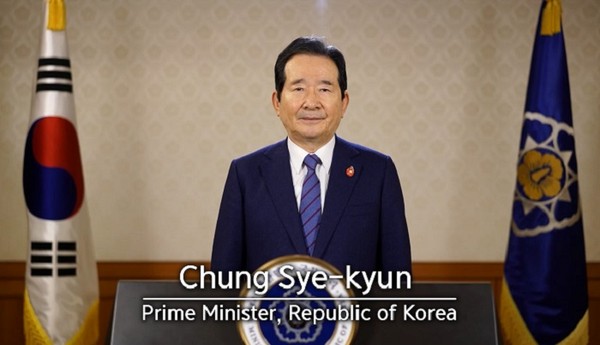
We were delighted to receive a congratulatory video message from the immediate past Hon'ble Prime Minister of the Republic of Korea, H.E. Chung Sye-Kyun, given on the occasion of the 50th anniversary of Independence of Bangladesh and the birth centenary of the Father of the Nation of Bangladesh, Bangabandhu Sheikh Mujibur Rahman.
It is our great honour that H.E. Mr. Ban Ki-moon was present as the guest of honour at the 4th Bangabandhu Lecture Series titled 'Bangabandhu: The Soul of Bangladesh', jointly organized by the Embassy of Bangladesh in Seoul and the Ministry of Foreign Affairs in Dhaka.
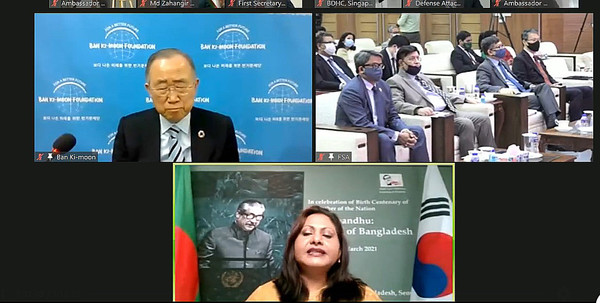
This is a clear indication of his amity for Bangladesh and its people, and respect and admiration for our Father of the Nation. We are mesmerized by his keynote speech where he aptly elaborated and analyzed Bangabandhu's life, philosophy, vision and shared his personal experience as a witness of the historical events between the two countries -the recognition of Bangladesh by the Republic of Korea and the establishment of bilateral diplomatic relations.
Despite the COVID-19 pandemic, Bangladesh saw its economy grow by 5.2 percent in 2020, followed by a growth of 8.2 percent in 2019 and 7.9 percent in 2018.
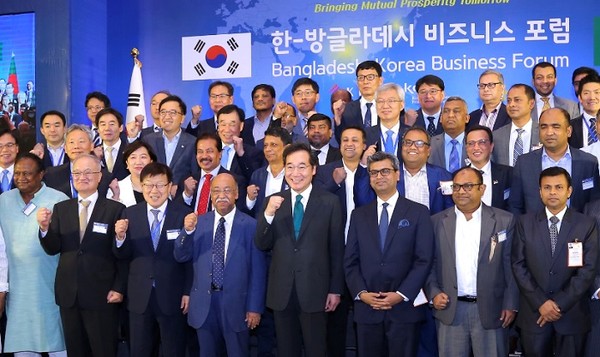
Q: We understand that business companies contribute to the promotion of relations between the countries. What are these companies which are doing such essential work between Korea and Bangladesh?
A: Korea was one of the first countries to recognize the potentials of Bangladesh and established a private Korean EPZ there- a symbol of our bilateral economic cooperation and a shining example of environment-friendly EPZ. We are thankful to Mr. Kihak Sung for his vision in this regard. His company Youngone Corporation is a pioneer in this regard. Apart from the textile and garment industry, many factories are operating in the K-EPZ in Bangladesh.
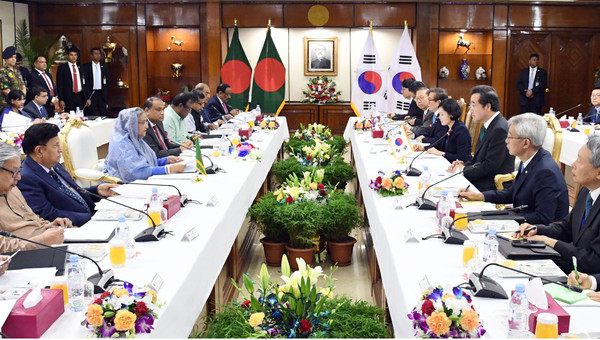
In addition, almost all the chaebols or conglomerates like Samsung, L.G., Posco, Hyundai have their presence in Bangladesh.
The Samsung Group companies, including Samsung Electronics and Samsung C&T, are active in Bangladesh with their expanding electronics base there. KIND (Korean Overseas Infrastructure and Urban Development Corporation) is involved in constructing several mega projects in Bangladesh with the PPPA (Public Private Partnership Authority) of Bangladesh. Bangladesh's SME Foundation has recently signed a memorandum of understanding (MOU) with K-biz to enhance bilateral engagements.
The second from the left in the front row is Chairman Ki-hak Sung of Youngone Corporation, who has laid a firm bridge between Korea and Bangladesh.
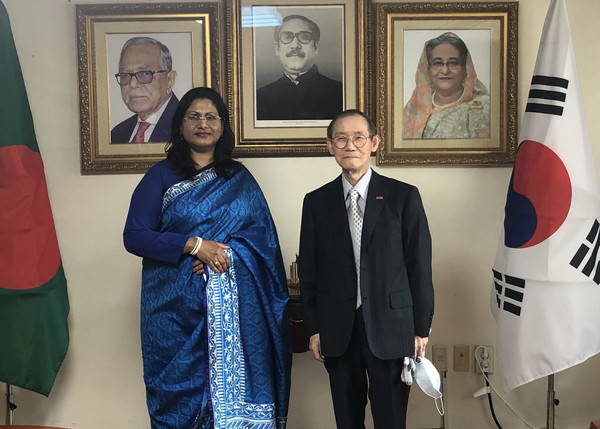
Q: Air transportation between the countries is very important and we hear that there has been an increase in the number of direct flights between Dhaka and Incheon.”
A: Noteworthy is the number of airlines that have flights between Dhaka, the capital of Bangladesh, and Incheon in Korea. However, since 2020, there have been direct chartered flights once a month. It has increased to twice a month from this year, contributing to promoting bilateral engagements and people-to-people contact between the two friendly nations.
Bangladesh is the world's eighth-largest country with a population of over 160 million. It is chiefly exporting clothing, leather and jute items, ceramic products and frozen foods to Korea. There are potentials for extensive collaboration in different sectors, including pharmaceuticals, bio-industry, shipbuilding and I.T. sectors of the two countries.
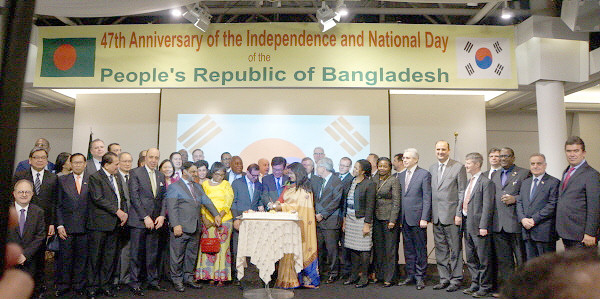
Q: What are the most attractive tourist attractions in Bangladesh?
A: Bangladesh is a country of natural beauty. You will find long beaches in Cox's Bazar and Kuakata, hills in Chittagong (officially known as Chattogram) Hill-Tracts, tea gardens in Srimangal and Panchagarh, Mangrove Forests in Sundarbans, Kaptai Lake in Rangamati, Coral Island in St. Martin's Island, floating vegetable market in Barishal, medieval ruined city in Gaur, and mighty rivers all over the country. The riverboats in Bangladesh come in all types of shapes and sizes, depending on the area. As a country of communal harmony, you will find ancient Buddhist Bihars, old Hindu temples and Churches, including several ancient beautiful mosques all over the country.
For instance, Ahsan Manzil, Sonargaon, Lalbag Fort, Shahid Minar, Sadarghat, Cox's Bazar Beach, Mangrove Forest in Sundarbans, and Bangladesh National Museum are among the most popular tourist spots that foreign travelers, including Koreans, visit frequently.
In particular, Dhaka, the capital city, is Bangladesh's most significant city, where visitors can see life and business coexist.
The first must-see attraction in Bangladesh is Cox's Bazar, located in the southeastern port city of Chittagong (officially known as Chattogram). Tourists love Cox's Bazar so much that it is called the capital of Bangladesh tourism. It is characterized by its golden white sand beach, the longest natural beach in the world.
The next attraction to visit is 'Paharpur' in western Bangladesh. This is a great temple built by the King of the Pala Empire in the south of the Himalayas and previously served as a cultural center in the Bengal region. Both length and width are 300m square in shape, and thick brick walls characterize it.
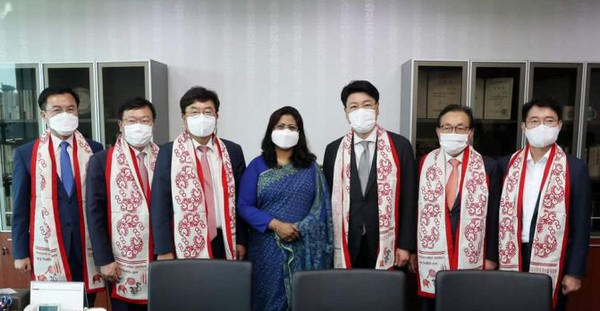
Another attraction is Bagerhat city in southern Bangladesh, known as 'Mosque City'. This city is an ancient city located near the entrance of Ganges and Brahmaputra rivers and was built by Ulu Khan Zahan in Turkey in the 15th century. These brick-built mosques are the remains of Islamic architecture that preserve the unique architectural techniques of the time.
We have many dietary attractions and among the foods liked most by the Koreans are 'Hajir Biryani' from old Dhaka. The fragrant 'kalajira' rice of Bangladesh mixed with mutton or chicken and several spices, give its scintillating taste. It is part of the Mughlai cuisine of the Indian subcontinent that is very popular all over the country.
Q: What are hobbies you do in your spare time?
A: My hobbies include singing Bangla songs, painting and cooking. I learned a few Korean songs as well at the diplomatic choir, like "Arirang”, “The Beautiful Country" etc. I love the melody of Korean songs. I also learned to cook a few Korean dishes as well. Due to the pandemic, I could not travel much, but I have visited most of the country's major cities.
The Bangladeshi people have much interest in Korean culture, such as Korean dramas, BTS, also known as Bangtan Boys (a seven-member South Korean boy band), and Korean movies. In line with this, I think there should be more interactions between the peoples of these two countries.
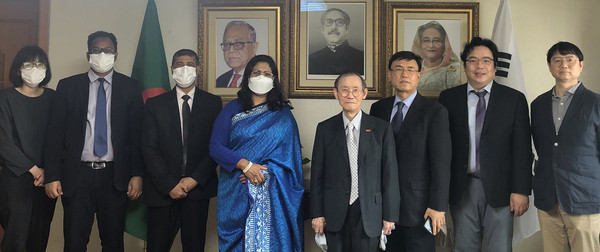
Editor’s note:
The People's Republic of Bangladesh serves as the corridor between Southwest Asia and Southeast Asia. Korea and Bangladesh have a commonality in their history of the struggle for independence. Both the countries struggled and sacrificed to preserve the dignity of their respective mother languages and alphabets. They share common values, democratic principles, ideals, and goals and strive to achieve them nationally and internationally. Bangladesh has been consistent in expressing its support for a peaceful, nuclear-free Korean Peninsula.
Since the establishment of formal bilateral diplomatic ties in 1973, Korea has enhanced her cooperation with Bangladesh in various fields, including trade and commerce, investment, workforce, development assistance, education and human resource development, ICT, defence, and cultural exchanges. Bangladesh is now proliferating as a developing country, officially becoming a middle-income country by 2026. Bangladesh also has boundless growth potential, with 65% of its population under the age of 35. The Embassy of Bangladesh has been working closely with the Korean Government and other stakeholders to uncover new prospects for partnership.
In addition, more than 150 Korean companies are known to be present in Bangladesh. Their various industrial establishments in the country make Korea the largest investor in the garment industry of Bangladesh. Korean investments in Bangladesh in recent years have been diversified into infrastructure, energy and consumer goods, which are expected to lead to further development of bilateral cooperation and relations.

